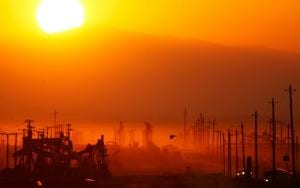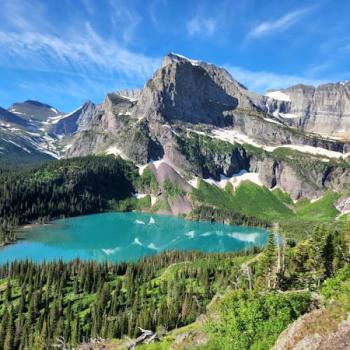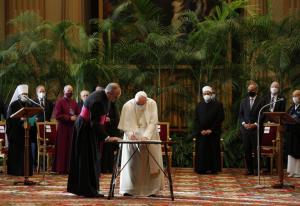
“Ecological sin: Idea of updating catechism sparks debate.” Catholic News Service ran this article as the year was just beginning. Several news organs reproduced it, including National Catholic Reporter in its EarthBeat section. Pope Francis had announced his intention to add a new category of sin to the catechism – ecological sin. It was one of the recommendations of the recently concluded Amazon Synod.
Offhand, it seems that there must be such a thing as ecological sin. All sorts of bad things are happening to the environment, for which people are responsible. How could this not involve sins? Yet people are objecting to the category of ecological sin.
Harming people is a sin, the CNS article quotes, but not harming the environment. The objector goes on: “as if the environment were a being.” It’s “too much like politics.” One person wondered, sarcastically, “how many extra squares of toilet paper a Catholic can use before it becomes a sin.”
Sarcastic or serious, that last quote at least brings the problem of ecological sin down to everyday life. The last paragraph in the article is more serious, but it raises the same issue:
The problem with the challenge we face is that such changes [to the environment] are both cumulative but also often invisible. It is hard to take moral responsibility for them as we don’t visibly ‘see’ what is happening.
So how do we know when we are sinning, or what does it even mean to sin ecologically? The article ends without an answer. I think an answer is both necessary and possible.
Ecological sin
I actually do think about how much toilet paper I use, as opposed to how much I should use. Even more, I think about how much hot water I waste when showering; and I do feel some guilt. I feel guilty about the amount of meat I consume and the food I waste, and the fact that I have not yet switched to an electric car. My daughter thinks I’m sinning when I flush the toilet, and it may be so. It may depend on where I am in the country. There is such a thing as objective reality, to which I have not conformed my life. That is the plain natural-law meaning of sin.
I suppose practically everything bad we do to the environment has always been a sin in one category or another. It was gluttony, stealing, murder etc. I think it’s the new situation of humanity and the world that makes the new category necessary. We are in the anthropological age. Human activity is what drives the development of the natural world more than any other factor. Before the modern age any pillaging of the earth that you could do was limited in space and time. You would hurt people but not the whole earth. Today we have the power, for better or for worse, to change the world for as far into the future as we can see. And we are doing that for the worse.
Gluttony isn’t just gluttony anymore. It may be poisoning the land, water, and air. Conspicuous consumption isn’t just stealing from the one who hasn’t enough to live. It’s a theft of the earth, which should be the inheritance of all future generations, besides having its own intrinsic value. By my actions today today in Minnesota I may be accessory to deaths on the far side of the planet and far into the future. That’s a qualitatively new situation.
Public and private sinners
Still my private actions’ effect on the world is rather small. I don’t fly around the world in a private jet. It’s hard to imagine that I’m murdering someone every time I leave the lights on. But there are public as well as private sins and sinners. It’s not hard to imagine the contribution to death, sickness, and reduced quality of life from public sins such as:
- A commercial enterprise that poisons the environment,
- A government policy that promotes or allows harm to the environment,
- A scientist who cherry-picks evidence to cast doubt on established ecological science,
- Lies and misleading statements that sway elections.
Here, I think, the category of ecological sin is most useful.
In a former age a pope could require kings to do public penance for especially egregious public sins. Today still, the Church deals with public sin, rightly or wrongly. A Catholic school fires a teacher for disobeying the Church’s marriage laws. A bishop bars a politician from Communion for his or her position on abortion. I don’t know of any Catholic politician or Church employee who has experienced ecclesiastical discipline for a public action that harms the environment. Why not?
A well-established concept of ecological sin would back up a bishop’s stand that might otherwise seem merely political. Bishops’ conferences could call particular actions what they are, sins. With abortion we don’t limit ourselves to sanctity of life language. We use the language of sin and intrinsic evil. The same language should apply to harming the environment. The new category of ecological sin may encourage bishops to use it.
Fossil fuel sinners, fossil fuel slaves
Jack Gladstone, member of the Blackfeet tribe and “Montana’s Troubadour,” sings about a “Fossil Fuel Sinner.” In the song he also names this person a “fossil fuel slave.” With that phrase Gladstone names my situation in the world. I’m a slave to fossil fuels. In the natural and social environment in which I live, it’s nearly impossible to live sustainably on the earth. Unwillingly, but not completely so, I participate in ecological sin.
Jesus makes a strange statement that seems relevant:
Woe to the world because of things that cause sin! Such things must come, but woe to the one through whom they come. (Matthew 18, 7)
Sin causes more sin. The world we live in is not just full of personal sins. It is structurally sinful. Especially today it is ecologically sinful. May we not be among the ones through whom such causes of sin come. May we be among those helping to free the world from ecological slavery.
Image credit: The Telegraph












